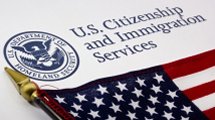By Brent Batten, Naples Daily News, Fla.
And subject to the jurisdiction thereof.
Six words you probably haven’t thought about since high school civics class, if then.
But they’re roaring into the national consciousness as the debate about illegal immigration intensifies in and out of the Republican presidential campaign.
A new study on immigration demonstrates just how important they are in Southwest Florida as well.
The six words form a clause in the first sentence of the 14th Amendment to the U.S. Constitution, which reads, “All persons born or naturalized in the United States, and subject to the jurisdiction thereof, are citizens of the United Statesand of the State wherein they reside.”
The sentence, conventional wisdom says, confers citizenship on anyone born in the United States. Children of illegal immigrants who are born here are automatically citizens, making deporting the parents that much more difficult. Hence the term “anchor baby.”
But hold on. A contingent of constitutional scholars, given sudden prominence by Donald Trump’s call for an end to birthright citizenship in his recently released immigration plan, argue that it doesn’t mean that at all.
If the authors of the 14th Amendment wanted to grant citizenship to every person born in the U.S., they could have simply written, “All persons born or naturalized in the United States are citizens of the United States and of the State wherein they reside.”
They injected “and subject to the jurisdiction thereof,” for some reason. What was it?
Traditionalists argue it pertains to the children of diplomats. With their diplomatic immunity, ambassadors and such aren’t subject to the jurisdiction of the United States, so their children born here aren’t citizens. Native Americans, at the time considered members of their own nations, were also denied citizenship at birth.
Taking the opposing view is Lino Graglia, a law professor at the University of Texas, who has testified before Congressand written on the topic of birthright citizenship. “It is difficult to imagine a more irrational and self-defeating legal system than one that makes unauthorized entry to this country a criminal offense and simultaneously provides perhaps the greatest possible inducement to illegal entry, a grant of American citizenship,” he told the U.S. House in April.
The clause in the 14th Amendment, passed in 1868, was drawn from the 1866 Civil Rights Act. It stated, “All persons born in the United States and not subject to any foreign power are hereby declared to be citizens of the United States.” That seems to indicate children of parents who are citizens of another country don’t qualify for birthright citizenship.
The authors or the 14th Amendment used different words, but there’s no evidence they intended a different meaning, Graglia said.
The Supreme Court has ruled the 14th Amendment conveys citizenship on children of immigrant parents born here. But that 1898 case didn’t specifically address whether that applies to children of parents here illegally, partly because when it was decided the nation had open and illegal immigration as we know it today didn’t exist.
Graglia, Trump and a growing number of conservatives believe it’s time for the meaning of, “And subject to the jurisdiction thereof,” to be tested again in court. “The federal government’s apparent assumption that the children of illegal immigrants have birthright citizenship as a Constitutional right is, therefore, clearly subject to challenge,” Graglia told House committee members.
A bill that has yet to gain much traction would do just that. H.R. 140 would define “subject to the jurisdiction” of the United States as people who are already citizens, aliens in the country legally and those serving in the armed forces. It is before the House subcommittee on security and immigration but no hearings are scheduled.
The bill has 27 co-sponsors in the House. Neither Mario Diaz-Balart nor Curt Clawson, Collier County’s representatives in Congress, have signed on. Neither responded when asked if they support or oppose the bill.
The Washington-based Migration Policy Institute last week released a report on unauthorized immigration that estimated the numbers of undocumented aliens in states and counties.
Using U.S. Census data and other demographic research, it conservatively estimates 11 million unauthorized immigrants are living in the United States.
About 605,000 of them live in Florida, according to the study. Collier County is home to 22,000 unauthorized immigrants and Lee County has about 27,000. Those figures represent 6 percent and 4 percent of the total county populations.
In each county, close to 90 percent of the unauthorized immigrants come from , Central America or South America.
The study also looked at the number of families with children. While H.R. 140 would not retroactively apply to those already here, the numbers do give an idea of the scope of birthright citizenship in Southwest Florida.
In Collier County, about 5,000 unauthorized immigrants are living in a household with at least one citizen under age 18. In Lee County, the number is 6,000.
Michael Fix, director of the MPI, said the study is the first he’s aware of that breaks those numbers down to the local level.
A nonprofit group dedicated to the study of worldwide migration, the MPI tries to avoid the charged political rhetoric now surrounding birthright citizenship. But a few years ago it studied the potential effects of repealing birthright citizenship. It showed that repeal wouldn’t have much of an impact on the number of undocumented immigrants in the U.S.
“Like everything we do, we did it in a pretty dry way,” Fix said.
With emotions ramping up, the coming debate promises to be anything but that.
(Connect with Brent Batten at brent.batten@naplesnews.com, on Twitter@NDN_BrentBatten and atfacebook.com/ndnbrentbatt
___
(c)2015 the Naples Daily News (Naples, Fla.)
Visit the Naples Daily News (Naples, Fla.) at www.naplesnews.com
Distributed by Tribune Content Agency, LLC.




























